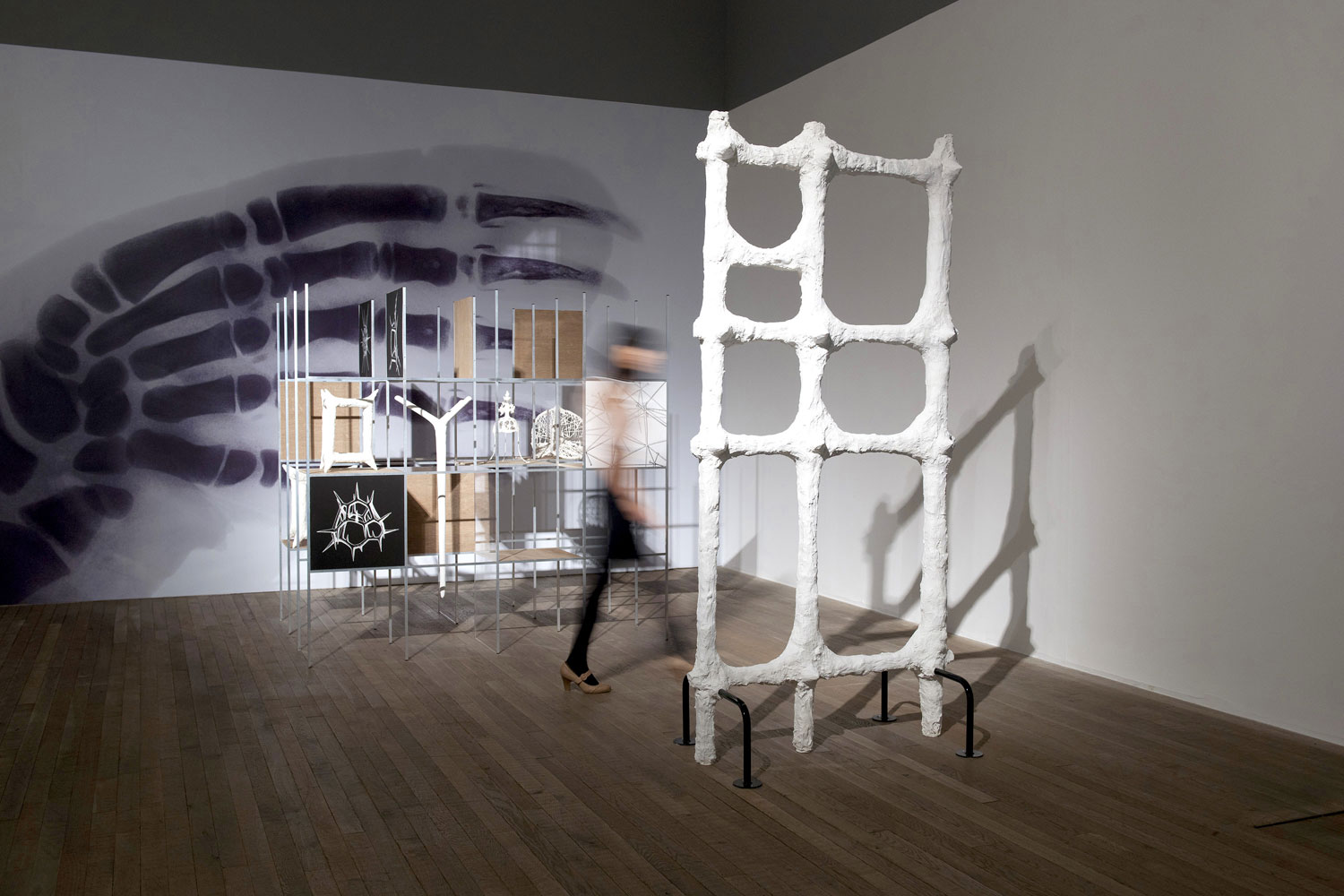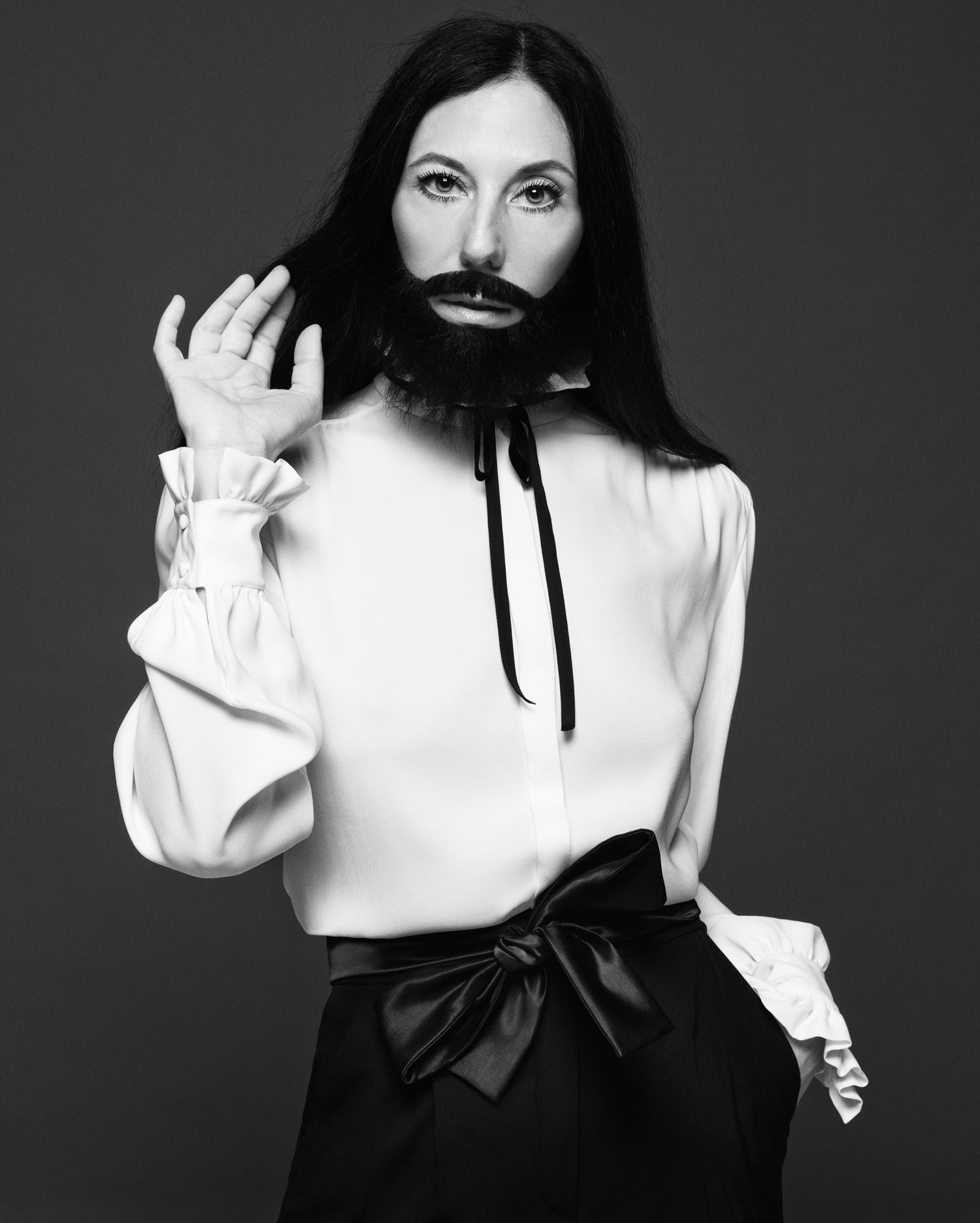Michele D’Aurizio: The current issue is published to coincide with the one-year anniversary of the release of Kanye West’s sixth studio album, Yeezus, and will circulate in Art | Basel and Design Miami/Basel, where, during last year’s edition, Kanye did an impromptu performance: he hosted a listening session of Yeezus, which was to be released a few days after. I am sure that people who attended it still remember. I was curious to learn if, after one year, the album has validated its legacy. I was struck by the take on religion in the record, and I want to grasp the specific understanding of religiosity by people who belong to rap culture.
Ilja Karilampi: In my opinion, Kanye is kind of psychotic. I am wondering if everything he’s doing — with some reservation, because I don’t want to just discuss his persona — is indirectly about the status he has reached where he is maybe considering himself as a demi-god more than a human being.
Bladee: What did he perform in Basel?
MDA: He played the first two songs of the record from his laptop, on an improvised stage decorated with Rick Owens chairs, in the hall of Design Miami/Basel. Then the audience begged him to sing, and so he performed “New Slaves” a cappella, and left the stage after that. The whole set was very fast, but also very powerful…
That said, I am also not really interested in his persona, but more in the kind of statement that the album was. Think about “I Am a God” — probably only John Lennon before him compared himself to Jesus… But Lennon intended it in terms of being popular, of being as famous as Jesus. While I have the feeling that Kanye’s words underlie a take on power.

Hua Hsu: I think Kanye has always been interested in both power and powerlessness. What makes him such an absorbing artist — for me, at least — is his ability to persuasively speak from both positions. “New Slaves” and “I Am a God” are both convincing performances, you know? Hip-hop has always been comfortable with contradiction — and there have been a lot of rappers who have cast themselves as God-like or recounted their struggles in relation to those of Jesus. But the contradictions have rarely been massive — going from “New Slaves” to “I Am a God” is the kind of gesture only he seems capable of.
IK: Bladee, what is your stance on how rap can cope with such large feelings? Do you think it’s through being on stage, through lyrics?
B: While you are on stage you get a lot of people coming up to you, you receive a lot of respect from people, and I guess this is the feeling that Kanye has. His fans idolize him, and this is why he talks about being a god.
I guess that’s part of the game of being a rap artist.
IK: How high can you go?
B: I guess that is where Kanye is at right now: he is almost at the same level where Michael Jackson was. He is so big now that he is branching out into culture and lifestyle, becoming something more than just a rap artist — a brand, I would say.
HH: Right. I think at this point it’s very difficult to parse Kanye-the-musician from his iconic status. There have always been artists for whom this was the case — the celebrity becomes part of (and perpetuates) the performance. The Michael Jackson comparison intrigues me. I think we can now look back and recognize those moments when Jackson suffered because of his success and the scrutiny that ensued. Kanye seems very sensitive to the possibility that his ascension might drive him mad — or that the media will begin to portray him this way, as somehow “crazy.” He’s self-aware about it — and yet this hasn’t really stifled his sense of ambition.
MDA: Do you think that being perceived as an icon is part of the agenda of a rap artist?
B: There are many different rappers: some aim to be just good artists and do good music and it doesn’t matter if they become famous; and some other rappers just strive to become something bigger. Of course you choose what you rap about and how you portrait yourself commercially, with videos and the clothes you wear, because when you are a rapper you are going to create a simulacrum of yourself.
IK: Bladee, I was wondering about some of your lyrics from the recent Gravity Boys mixtape, “Hold Me Down Like Gravity” for example, which I was listening to incessantly while creating some works for Frieze in London last fall. I felt I was really floating above something, like in a spiritual state without being really there, I would say.
B: When I write lyrics I don’t want them to be too personal: I want to establish a balance between the commercial scenario that surrounds me — clothes and items I am into — and life experiences. This is because I don’t want to be an artist that just raps about feelings, but I want to frame them in my sociocultural environment.
IK: Sometimes I get tired of listening to lyrics by R. Kelly, for example. I realize I am actually listening to a multi-billionaire singing about all the luxury goods he bought. Similar perhaps to listening to the CEO of Volvo swinging out on his car…
B: Of course there is a difference between artists like R. Kelly who is owned by a company — his music lost something when he signed. Anyway, sometimes I like to listen to something commercially good, something that sounds made just for making money — that can be good also.
IK: It can be good as well, it depends on the artist. I saw Drake in Berlin a month ago. They built big a ring over the whole stadium, so he could walk around the crowd and point out people and say, “I see you there” to the girl with the Berlin t-shirt… It is this larger-than-life thing that happens at a certain stage, and you can do it when you get people to pay to see it.
This makes me think again about transcendentalism, as Eastern religions intend it: a state of being higher… not necessarily being God, but the feeling that would make you float away a little bit. For example, how would you relate to Lil Wayne’s lyric when he sings: “Hop up in my spaceship and leave Earth”? Do you agree it is a metaphor for a sort of escapism?
B: I guess there are deeper meanings, but it can also just be about getting high… In some of Lil Wayne’s lyrics you feel that he wants to say something about the person he is. I believe he is indeed struggling with being famous… He just wants to leave.
IK: …and actually having to be normal sometimes, because you can’t be on an all-time-high all the time. Look at Wiz Khalifa: how much weed does he smoke?
B: He is famous for being a weed smoker, so that’s what he is now.

IK: We would not offend him if we call him a junkie I suppose… If Juicy J was drinking all the liquor and doing all the drugs he talks about, he would be dead by now.
B: Rappers are surrounded by fans, people who don’t really know them but want to hang out with them because they are famous. So I guess that taking drugs is some sort of escape from their role.
IK: One thing I always admired about the Hasidic Jewish community is that they turn to an ecstatic state for feeling closer to God — singing, dancing, sometimes even getting wasted on wine… Sometimes I even think Chief Keef and such are portraying that faded mind of bliss by enjoying themselves while they do it.
HH: In a way, I think this is what Kanye aspires to do with his live shows. I saw the Yeezus tour and it was so steeped in religious iconography. The set design was so careful and thoughtful. And yet Kanye remained himself — brash, loud, hyper, excitable, like he was incapable of being an austere set piece.
MDA: I’ve always been interested in the diagrammatic behaviors traceable in rap culture. Also, the notion of transcendentalism that you mentioned before, Ilja, helps introduce another topic — the sort of very linear path of coming from a specific social background, usually imbued with economic destitution and the suburban landscape, and the attempt at emancipation from that. I guess that this specific context inevitably engenders some specific behavioral patterns… So I want to ask about the notion of revenge in rap culture, which I find very close to the idea of redemption in Christianity.
HH: Hip-hop’s relationship to religion is complex — it really mirrors the experience of African Americans at large, but it reverses some of the tenets of traditional spirituality: the extreme modesty, the deferral of rewards. Of course there’s also the influence of the Nation of Islam, which often takes on a more cultural or political rather than strictly religious edge. But I think you can really feel the religious influence in this ambient way. It’s in hip-hop’s sense of deep-seated dread, its moments of weakness and confusion, its occasional desire for penitence.
B: Spending a lot of money should be a very confusing experience if you are not used to it — it could definitely makes you high. Anyway, I strongly think that power and status comes with talent and determination. The money comes afterwards. But definitely you can say that all the artists we mentioned are talented and determined.
MDA: What do you mean when you say that you respect somebody? Who are the rappers that you respect and why?
B: It is because of their whole persona: where they come from, their community. But also the brands they wear, their cover art and the visual strategy they employ for conveying their music, what they say in interviews…
IK: One should not forget that it is actually the creation of innovative content that brings it to a next level. All the interesting artists in rap or other musical genres, but also in contemporary art, are innovative voices. Look at the established rappers: they always approach new talent because they need to stay in touch with what is innovative… Innovation can result in decoration: the covers, the clothes, all these artistic or aesthetic codes that we are using to communicate with other people… We are surrounded with such an amount of stimuli, and ways of communicating through aesthetics are becoming more and more refined. So it’s not enough anymore to put a guy in a car on an album cover, although some people could do it for fun and it would still work, but it has to be done with a twist.

MDA:Yeezus had no cover, it was almost iconoclastic…
IK: I know. But I don’t even want to talk about things like Jay Z’s performance at the Pace Gallery; if you are only able to namedrop artists like Picasso in your lyrics you are not worthy to collaborate with the contemporary art world.
MDA: I guess in Jay Z’s case it is just about status symbols. Probably people like Kanye are more sophisticated than that, because they probably know their boundaries, they are totally aware of the clichés that haunt their community. I mean, in Yeezus he sounds definitely arrogant, but in a way that is also very human. Yeezus talks a lot about ambition.
IK: It’s only human in the way that a fallen Roman emperor is human, I think. “The king is dead, long live the king!” Sometimes I even get annoyed when people ask me about rap — it feels like the names are too old for new genres. Sometimes I cannot even talk about what I am listening to, because music has blended itself to a such beyond level.
MDA: In your art, Ilja, you are indeed playing a lot with the aesthetic codes that we were discussing before. Is yours an attempt to establish them as a vocabulary? Or maybe it has to do with the inquiry of imagery and so with the desire to define a community and lifestyle?
IK: With some of the wall pieces I have done and when I work with text, as in the mirrors, some of the texts are so powerful as sentences that when you read them it could be about your life. And so it actually empowers you, in the best case. Some of those “started from the bottom” lyrics can be read as success stories — the work itself is starting from the bottom. That ambition you described before can be very beautiful, and it can produce very big things, things that are beautiful because of the inner aspiration that took them there.





